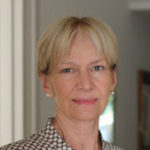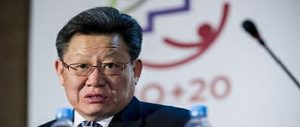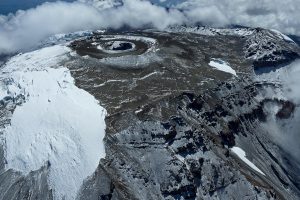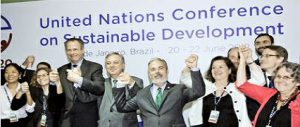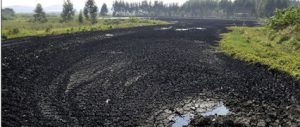The closing declaration of the Rio+20 conference in June was greeted with almost universal disappointment, but Jacqueline McGlade, executive director of the European Environment Agency (EEA), came home from Rio delighted. The EEA had successfully pushed the importance of environmental data sharing and its ambitious information sharing network, Eye on Earth, was cited in paragraph 274 of the final text.
For professor McGlade, this is a significant step towards open environmental information, something she sees as essential to achieve better water governance. With good governance, she argues, even extreme stress can be handled, citing Singapore as an example.
“They have taken water into heart of economy,” she explained. “They have the idea of the ‘Four Taps’– local catchments, water imports, reclaimed water and desalinated water; and they think of water as money in the economy. They harvest and reuse, and they create space for water to be absorbed in small marshes. The result is that they no longer have to import water at all.”
The Colorado River is another excellent example, McGlade said, of good management of a limited resource, despite the competing interests of Mexico and the US, of many states along the river, and cities like Las Vegas that have no watershed of their own and depend totally on the river flow. It took 20 years, she said, for a sophisticated governance model to evolve that regulates access and gives early warning of falling water levels.
“Information is at the heart of it. In the lakes that supply the downstream states, there is a very transparent exchange of information on water levels,” McGlade explained, “which triggers different decisions about how much water can be abstracted.”
Trans-boundary rivers in some parts of the world are seen as sources of tension, but McGlade argues that they can help drive good governance. “With international waters,” she said, “there is often external pressure to sort out the governance. The Danube and the Rhinein Europe are good examples of international water negotiation. Again, it depends on data transfer and getting information to flow to all the parties.”
The existence of the European Union (EU), with its regular contacts between ministers and its culture of cooperation, admittedly helped to overcome barriers to data sharing. In regions where cooperation on other issues is low, resistance to sharing environmental data can still be high.
“In Asia, for instance, inter-state and cross-border discussions are not well developed, except for the Mekong delta, where the consequences of not coming to a common outcome were highlighted by what those countries had experienced in the previous 10 years,” said McGlade. More water stress, she believes, might also help. “Climate change will accelerate the ill effects of bad water governance, which might trigger some improvement,” she said.
But if data sharing is essential to good governance, how can it be achieved in Asia? McGlade said it is important to identify a trusted, independent body to act as impartial guardian of data.
“The tricky part of negotiations,” she said, “is to decide how much water comes in, how much is retained and how much is transferred across the border. If that information is held by an independent body, it’s much harder to challenge.”
The EEA plays that role in Europe and, now, in regions beyond Europe. “We did this in the UN Economic Commission countries, including Russia, USA and Canada. This has helped discussions on air quality, for example,” she said. “They see the agency operating even-handedly, so countries that are quite suspicious of each other, and of the rest of the world, can sit down and share. Step by step, the world is opening up.”
“It took three years to sign a complete memorandum of understanding with Russia on the direct exchange of air quality data in real time,” she said. “Now, through Eye on Earth, our air quality data goes from the west coast of the US to the east coast of Russia.”
Now she is promoting water data sharing. “We are starting out with e-coli and nitrate concentrations. Water is quite localised and you would want to look at different things in different places. The next step will be to put a water database together and put it online.”
The ambitious project will take on rivers, standing water bodies and underground aquifers.
“We are discussing a global observatory for on-the-ground observations that will be connected to the satellite community,” she said. “With Eye on Earth in the Rio declaration, we have a focal point: countries are collecting information, and the international network helps towards a common appreciation of where we need to put our resources: common eyes, then common action; that is how you get good governance.”
Could the European approach work in South Asia, where nation states still guard water data closely? In Bhutan, she said, the EU is helping to monitor the government’s promise not to damage the glaciers. “They need accurate measurements of ice thickness and river flows to monitor this contribution to the global public good. We will help them share that data,” she said. In Nepal, she plans to use teams that are gathering data on black carbon to look at water, too. Even in India, she said, there is a growing understanding that sharing is essential to guarantee accuracy.
“India is realising that they need to be more open and transparent about the quality and flow of fresh water in order to improve their own data; we anticipate that they will build their own network of data providers and then move to sharing. More and more countries in Asia realise that good [water] allocation and governance depends on information sharing.”
Besides, she agreed, today’s technology means keeping environmental data secret is becoming more and more difficult.
“We have low orbit satellites that look at salinity; we can calculate how much water is flowing out of a river; the GRACE project uses gravity and distortions of the earth’s surface to reveal groundwater, we can see so much more about resources than even five years ago. The new range of EU Sentinel satellites will enhance that even more.”
And on the positive side, governments can benefit from cloud-based computing which makes data more accessible and avoids the need to produce different reports to meet different demands.
“With Eye on Earth,” she said, “we had to face the challenge of inter-operability. We also helped countries that were not quite up to speed jump straight to the cloud, so they don’t need to build large computing facilities of their own to handle today’s big data sets. Through the cloud, they can mix data streams and use the whole computing power of Europe if they want to. It is a huge benefit to them.”
Isabel Hilton is editor of chinadialogue.
Homepage image by StudentReporter

